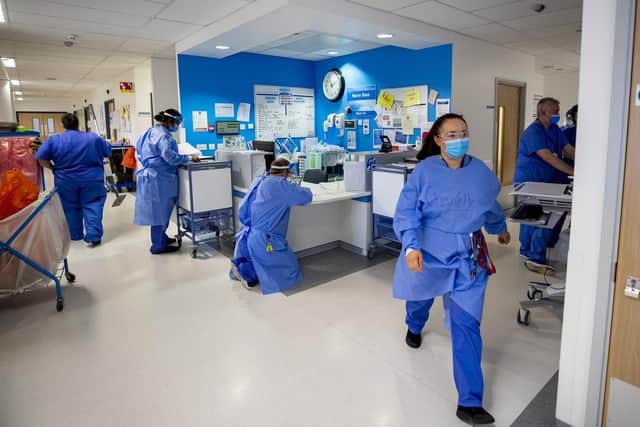Scotland's A&E crisis: Waits of 12 hours now a daily occurrence amid winter fears
Dr John-Paul Loughrey, vice-chair of the Royal College of Emergency Medicine Scotland national board, warned that while such long waits were once regarded as “never events,” they are now daily occurrences.
Amid fears the delays will spike significantly over the winter months, especially with another wave of Covid-19 expected, Dr Loughrey said staff were already “burned out,” “exhausted,” and “overwhelmed with a system facing increasing strain.”
Advertisement
Hide AdAdvertisement
Hide AdThe consultant in emergency medicine at the Queen Elizabeth University Hospital in Glasgow also said the winter resilience plan set out earlier this month by health secretary, Humza Yousaf, offered “little meaningful action,” save for its focus on social care.
The latest weekly data on A&E treatment shows that in the week ending 2 October, the number of patients waiting more than 12 hours had soared by 45 per cent week-on-week.
The data, produced by Public Health Scotland, found that a record 1,510 patients endured such a wait, compared to 1,039 the week before.
“There is deep concern among staff around the excessively long waiting times,” Dr Loughrey said. “The weekly data that show significant increases in long waits translates to real patients on the ground or in the community who are seeking urgent and emergency care.
“The system is failing them. We know that long waiting times are associated with patient harm and even death. Staff face moral injury daily, but they are working incredibly hard and doing all they can to minimise this harm to patients.”


The Scottish Government has said it will recruit 1,000 additional NHS staff over winter. That includes 250 support staff across acute, primary care, and mental health. Some £124m will also be directed to assist health and social care partnerships to expand care at home capacity.
But Dr Loughrey said the measures will only have a limited impact.
“We welcome the focus on social care in the winter plan, that is the singularly most important short-term issue,” he explained. “We must bolster the social care workforce. This will help with the provision of care in the community and crucially, help with the discharge of patients from hospital.
Advertisement
Hide AdAdvertisement
Hide Ad

“Aside from this, the winter plan offered little meaningful action. We urge the government to increase the available bed base across Scotland. Expanding capacity where safely possible will be a vital help this winter.”
A spokesman for the Scottish Government said the pandemic was continuing to affect services “in common” with healthcare systems in the UK and globally.
He said: “We are recruiting 1,000 new NHS staff, including 750 frontline nurses from overseas this winter. Our £50m urgent and unscheduled care collaborative looks to help improve A&E performance, and we will continue to seek to work collaboratively with the Royal College of Emergency Medicine to achieve this.
“Central to this is a recognition that the pressures experienced by A&E are driven by delays in discharge elsewhere. That’s why a focus of our winter plan is on social care and actions to encourage integration authorities to help alleviate these delays, ultimately to free up hospital beds.”
Comments
Want to join the conversation? Please or to comment on this article.
